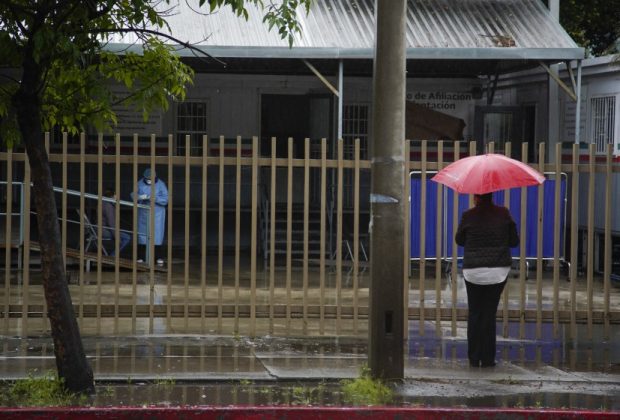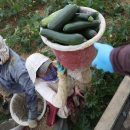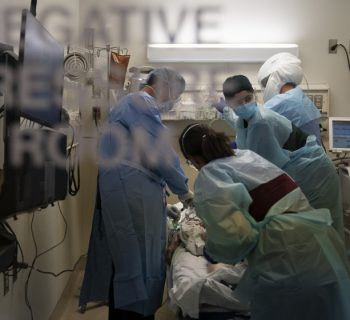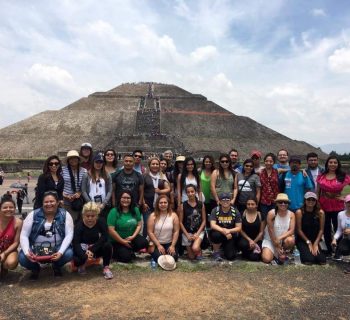Patients are being treated in receiving areas and lobbies while doctors and nurses say they lack the staffing, ventilators and testing to properly care for them
By WENDY FRY, ALEXANDRA MENDOZA, San Diego Tribune – APRIL 10, 2020
TIJUANA — Inside Tijuana emergency rooms and hospitals, defeated health care professionals are working double and triple shifts, without the equipment they need, as their colleagues fall sick, one after another.
Patients are being treated in receiving areas and lobbies while doctors and nurses say they lack the staffing, ventilators and testing to properly care for them.
At least 14 health care professionals have tested positive for COVID-19 and two are in intensive care across the state, Baja California officials confirmed Thursday.
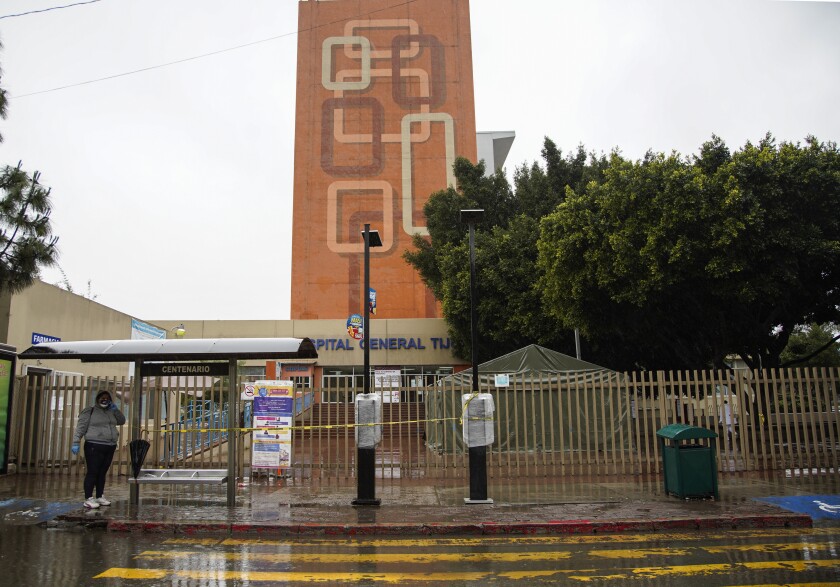
Tijuana, Baja California, Mexico April 10th, 2020 | Tijuana’s hospitals being overrun with coronavirus patients. Hospital GeneralEdeETijuana closes it’s gates. | (Alejandro Tamayo, The San Diego Union Tribune 2020)(Alejandro Tamayo/Alejandro Tamayo/The San Diego Union Tribune)
“Leaving the hospital today, I felt like I was leaving a war zone,” said one local doctor, who said she could not be identified because she was not authorized to speak with the media about the situation.
A lack of resources and training in the face of the pandemic has spurred a number of protests by workers in Mexico’s public health system in recent weeks.
President Andrés Manuel López Obrador has conceded that the system does not have the number of doctors and nurses that it needs as the epidemic begins to ramp up in Mexico.
Nurses described the situation inside Hospital General in Tijuana as “desperate” and “very grave” on Friday.
“We are already completely full,” said a nurse, who said she was unauthorized to give her name or speak with the media about conditions inside the hospital.
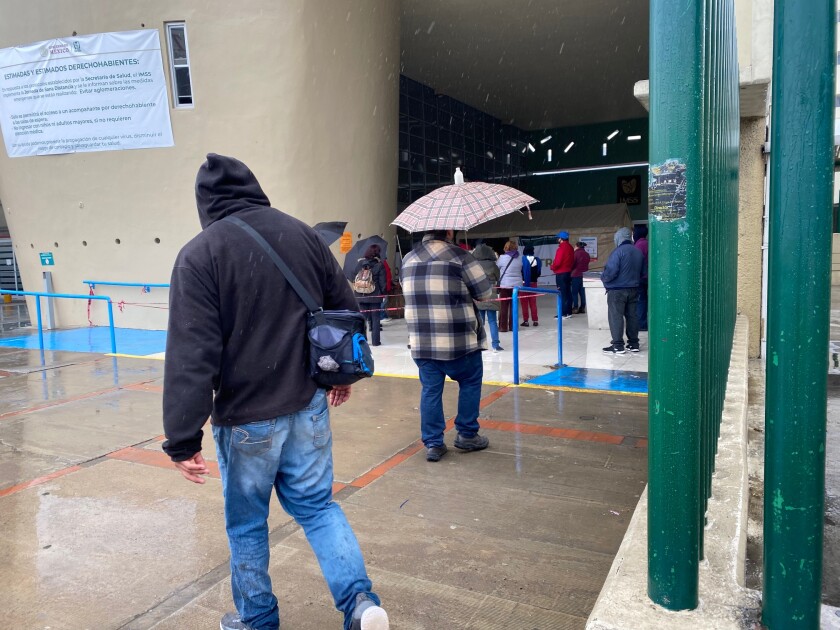
During Friday’s downpour, a small crowd formed outside IMSS Clinic 20 in Tijuana as they waited to be let inside the hospital to receive medical attention. Many were wearing masks and coughing, but they are photographed from behind to protect their medical privacy.((Wendy Fry / San Diego Union-Tribune) )
During Friday’s downpour, a small crowd of patients huddled under an awning outside IMSS Clinic 20, another general hospital in Tijuana. Many of them were coughing and wearing masks as they waited more than 30 minutes to be let inside to receive medical care.
A doctor outside the hospital said he was not authorized to speak with the media about what was going on inside.
Reyna Beltrán, former president of the College of Surgical Nurses of Baja California and vice president of the Federation of Surgical Nurses of the Northern Region, works as a nurse at IMSS Clinic 20.
She estimated at least 20 health care professionals including the director of the hospital, nurses, doctors, the emergency room supervisor and several orderlies are sick with suspected coronavirus infections — some critically.
She said she’s had to scour Tijuana pharmacies for reasonably-priced masks and gloves for her colleagues because “people are getting sick” and the hospital is running out of supplies.
“There is an outbreak of COVID-19 among doctors and nurses, because of a bad diagnosis process and because we didn’t have the personal protection equipment ... " said Beltrán.
Hospital General’s chief of internal medicine, Dr. Francisco Alejandro Gutiérrez Manjarrez, sent an urgent letter Thursday to state health officials highlighting the hospital’s need for more personal protection equipment, including gloves, N95 masks and shoe covers.
Gutiérrez’s letter said the personal protection equipment would be “used to care for patients with atypical pneumonia, suspicion and confirmation of SARS-COV2 infection.” The phrasing is significant because Gutiérrez is the first local doctor to officially link atypical pneumonia cases with coronavirus infections.
Many community members and some medical health professionals have alleged Mexican health officials are concealing the true number of coronavirus cases by classifying them instead as “atypical pneumonia” cases. Authorities have denied those claims.
For most people, the coronavirus causes mild or moderate symptoms, such as fever and a cough that clear up in two to three weeks. But among older adults and people with existing health problems, it can cause more severe illness, including pneumonia and death.
Hugo López-Gatell, who serves in Mexico’s Ministry of Health as an undersecretary for health promotion and prevention, said Wednesday the number of actual coronavirus cases is “almost certainly” 8.3 times more than the number of confirmed cases. López-Gatell said he based his estimates on the same modeling and extrapolation health officials already use to track cases of influenza.
As of Friday, Baja California has 304 confirmed coronavirus cases, and 25 patients have died from the disease. However, health experts consider that number to be only a fraction of the total cases because testing is severely limited in Baja California and Mexico. A lack of available testing has also been a concern around the world, including in San Diego.
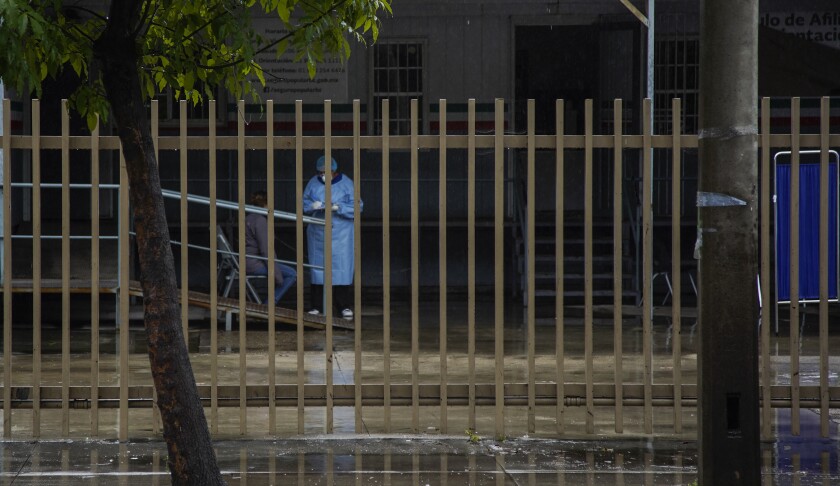
Tijuana, Baja California, Mexico April 10th, 2020 | Tijuana’s hospitals being overrun with coronavirus patients. Hospital GeneralEdeETijuana. A medical worker is giving exam to a female who recently arrived. | (Alejandro Tamayo, The San Diego Union Tribune 2020)(Alejandro Tamayo/Alejandro Tamayo/The San Diego Union Tribune)
Volunteer paramedics in Tijuana fear that if the situation worsens, they will no longer be able to assist authorities by transferring patients with coronavirus or atypical pneumonias to local hospitals.
“We will respond within our capabilities,” said Mario Montes, president with the Association of Rescue Groups of Tijuana. “But we also have families, so we need to be safe and responsible.”
In Tijuana, the Red Cross and fire department respond to all emergency medical calls. Civil associations, such as volunteer rescue groups and private ambulances, serve as an additional line of defense.
On Thursday, a coalition of volunteer rescue groups and paramedics warned they lack the necessary equipment to protect both patients and themselves.
“If you use an ambulance for COVID-19, you have to decontaminate it, otherwise you are putting more people at risk,” said Montes.
And cases in Tijuana are only expected to rise.
“When things get out of control we’re going to have to respond,” said Montes. However, if masks and gloves are not available, they won’t be able to help, he said.
Orlando Jiménez, a member of the Rescate Tijuana group, has worked as a paramedic for 24 years and said he never imagined an emergency of this magnitude.
He says rescue groups have held meetings since they saw the situation in China, anticipating that things could get complicated in Tijuana.
“There is no protective equipment even for doctors and nurses. What can we expect for us?” said Jiménez.
Mexican health officials said Friday a plane full of medical and personal protection equipment from China was scheduled to arrive this weekend.
Baja California Secretary of Health Alonso Pérez Rico said Friday only 113 patients with confirmed cases of coronavirus are hospitalized across the state. However, he acknowledged the true number of cases in the community is likely much higher, urging people to continue practicing “safe distancing” and remain at home.
“Stay in your home. Stay in your home. Stay in your home,” he urged.
Tijuana’s professional basketball team, the Zonkeys, have donated their stadium to serve as an additional hospital, and 92 hospital beds have already been set up there, he said.
It isn’t receiving patients yet because the public hospitals in Tijuana are not yet 100 percent full, said Pérez Rico.
“This is our Plan B. We have a Plan C and we’re already coming up with a Plan D,” the state health official said on Friday.
Last week, the state created a Google form to recruit volunteers with health care experience to attend to patients with COVID-19.
A total of 865 people had signed up as of Thursday. Pérez Rico said everyone accepted into the program will be trained.
Staff photographer Alejandro Tamayo contributed to this report.

